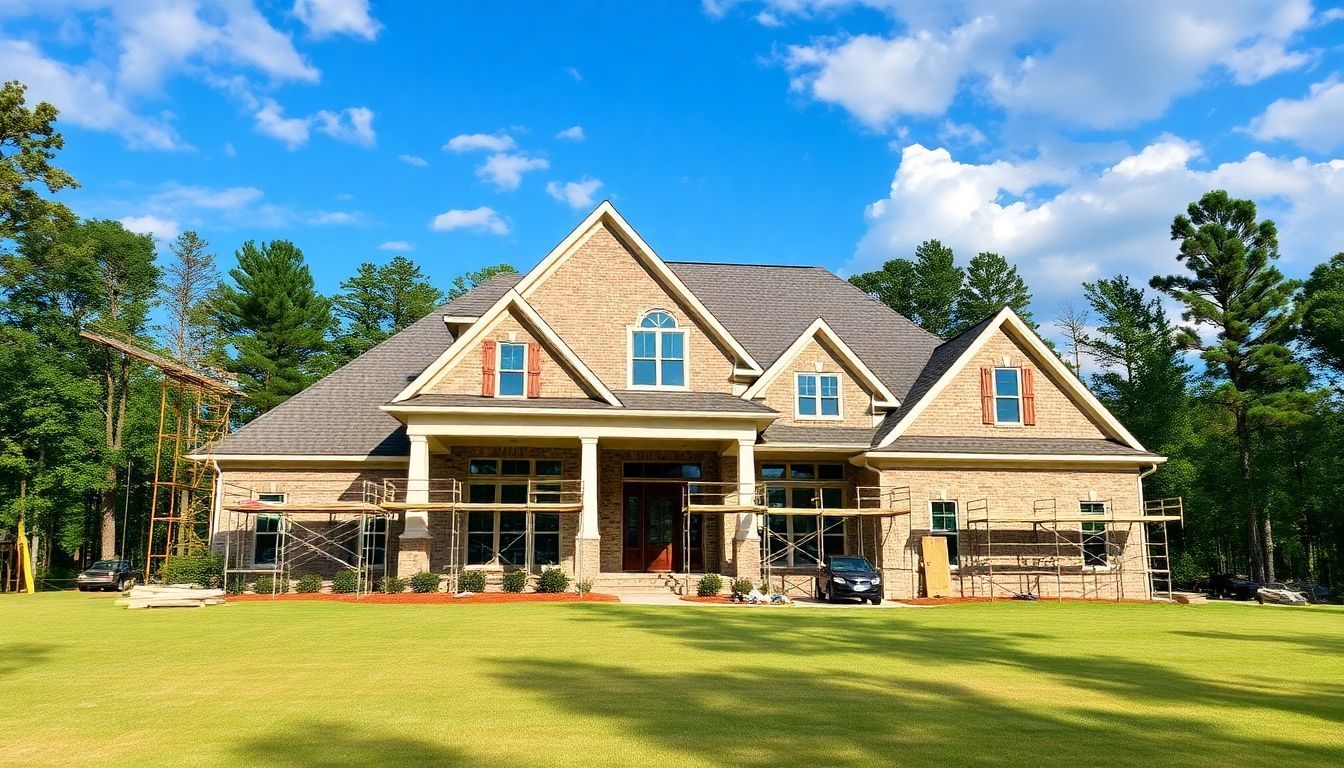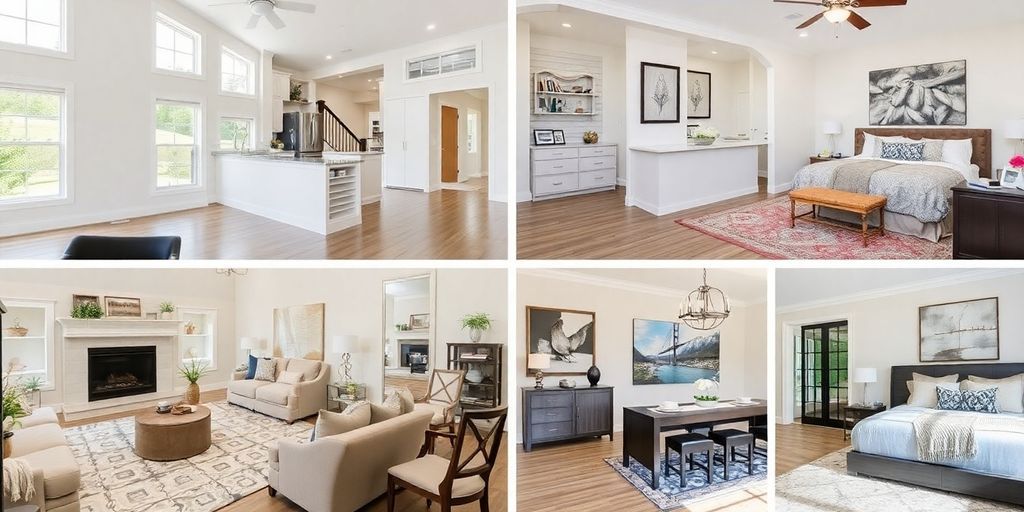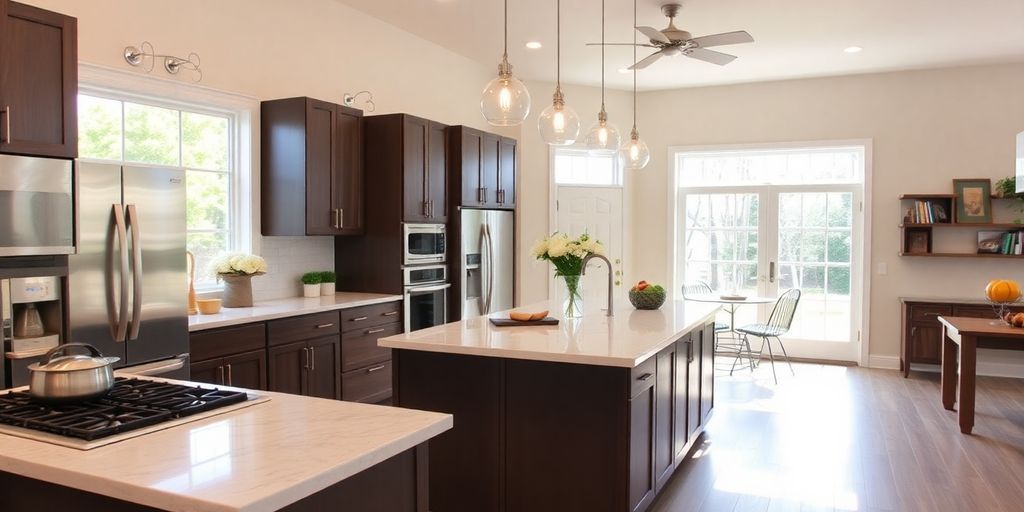How to Choose the Right Custom Home Builder in LaFayette, GA

Choosing the right custom home builder in LaFayette, GA, is a big deal. It’s not just about picking someone to throw up walls and a roof; it’s about finding a partner who will guide you through the entire building process. With so many options out there, it can feel overwhelming. But don’t worry! We’ll break down everything you need to know to make an informed decision and help you find the perfect fit for your dream home.
Key Takeaways
- Understand what a custom home builder does and how they differ from production builders.
- Research local builders through online reviews and personal recommendations.
- Check the builder's experience and ensure they have the right licenses and insurance.
- Evaluate how well you communicate with the builder and if your visions align.
- Review their past projects and ask for client references to gauge their reliability.
Understanding Custom Home Builders
What Is a Custom Home Builder?
So, what exactly is a custom home builder? Well, they're not just your average construction crew. A custom home builder specializes in creating homes tailored to your specific needs, desires, and the unique characteristics of your land. They're involved in everything from the initial design phase to the final touches, ensuring your vision comes to life. Think of them as project managers, problem solvers, and dream-weavers all rolled into one. They handle the submission of your house plan to your town or city council and will follow through until the building permit has been issued.
Benefits of Hiring a Custom Home Builder
Why go custom? There are tons of reasons! It's more than just getting a fancy house; it's about creating a space that truly reflects you. Here are a few perks:
- Personalization: You get a home designed around your lifestyle, not some cookie-cutter model.
- Quality: Custom builders often use higher-quality materials and craftsmanship.
- Uniqueness: Your home will stand out from the crowd, reflecting your individual style.
Hiring a custom home builder in LaFayette, GA, means you're investing in a home that's built to last and perfectly suited to your needs. It's about creating a legacy, a place where memories are made, and a space that you'll truly love for years to come.
Key Differences Between Custom and Production Builders
Okay, let's break down the difference between custom and production builders. Production builders typically work with pre-designed plans in large developments. You might get to choose some finishes, but the overall layout is pretty much set. Custom builders, on the other hand, start with a blank slate. They work with you (and often an architect) to design a home that's completely unique. Here's a quick comparison:
- Flexibility: Custom builders offer more flexibility in design and materials.
- Scale: Production builders usually work on a larger scale, building many homes at once.
- Cost: Custom homes often cost more due to the personalized nature of the work. It's important to find experienced home builders who have been serving your local community for many years.
Researching Local Builders
Finding the right custom home builder in LaFayette, GA, requires some digging. You can't just pick the first name you see. It's about finding someone who understands your vision and can bring it to life. Let's explore how to find the best local builders for your project.
How to Find Custom Home Builders in LaFayette GA
Okay, so where do you even start? Well, a good first step is to use online search engines. Search for terms like "custom home builders LaFayette GA" or "new home construction LaFayette." Look beyond the first page of results. Local directories and home building associations can also provide lists of builders in the area. Don't forget to check out local building supply stores; they often have recommendations too. Basically, cast a wide net!
Checking Online Reviews and Ratings
Once you have a list of potential builders, it's time to do some online sleuthing. Check out sites like Google, Yelp, and the Better Business Bureau. Pay attention to both the overall rating and the content of the reviews. Look for patterns. Are there recurring complaints about communication, quality, or timelines? Keep in mind that every company gets a bad review now and then, but a consistent stream of negative feedback is a red flag. It's also worth checking out their social media presence to see how they interact with customers and showcase their work. A negative review can be a sign of trouble.
Asking for Recommendations from Friends and Family
Never underestimate the power of word-of-mouth. Ask your friends, family, neighbors, and coworkers if they have any recommendations for custom home builders in LaFayette. Personal referrals can be incredibly valuable because you're getting firsthand accounts from people you trust. When you get a recommendation, be sure to ask specific questions about the builder's strengths and weaknesses, their communication style, and whether they would use them again. It's also a good idea to ask for photos or even a tour of the completed home, if possible. Remember, building a home is a big deal, so getting insights from people you know can really help you make the right choice.
Word-of-mouth referrals are great, but always do your own research too. Just because someone else had a good experience doesn't guarantee you will. Verify licenses, check references, and review their portfolio before making any decisions.
Evaluating Experience and Credentials
c
Importance of Experience in Home Building
When it comes to building your dream home, you don't want to be someone's guinea pig. Experience matters, plain and simple. A builder with years under their belt has likely seen it all, from tricky weather conditions to unexpected material shortages. They've developed problem-solving skills and know how to navigate the complexities of construction in LaFayette, GA.
Verifying Licenses and Insurance
Before you sign any contracts, do your homework. Make sure your builder has the proper licenses and insurance. This isn't just a formality; it's protection for you. Here's what to check:
- License: Verify that their license is current and valid in Georgia. You can usually do this through the state's licensing board website.
- Liability Insurance: This protects you if something goes wrong on the job site, like property damage or an accident.
- Worker's Compensation Insurance: This covers any injuries to workers on your property. If a worker gets hurt and the builder doesn't have this, you could be held liable.
It's a good idea to ask for proof of insurance and to independently verify the information with the insurance company. Don't just take the builder's word for it.
Understanding Builder Specializations
Not all builders are created equal. Some specialize in certain types of homes or construction styles. For example, some builders focus on:
- Modern Homes: Sleek designs, energy-efficient materials, and smart home technology.
- Traditional Homes: Classic architecture, detailed trim work, and timeless appeal.
- Eco-Friendly Homes: Sustainable building practices, renewable energy sources, and green materials.
Choose a builder whose specialty aligns with your vision. A builder with relevant experience will be better equipped to handle the unique challenges of your project.
Assessing Communication and Compatibility
Choosing a custom home builder isn't just about finding someone who can build a house; it's about finding someone you can work with comfortably for months, maybe even a year or more. You'll be making a ton of decisions together, so how well you communicate and how compatible you are matters a lot. It can seriously impact the whole building process.
Importance of Clear Communication
Clear communication is the bedrock of a successful custom home build. If you and your builder aren't on the same page, things can go south quickly. Think about it: misinterpretations of design ideas, budget misunderstandings, and scheduling conflicts can all arise from poor communication. You want a builder who listens actively, explains things in a way you understand, and keeps you informed every step of the way. It's not just about them talking to you, but also with you.
How to Gauge Compatibility with Your Builder
Compatibility goes beyond just liking your builder. It's about shared values, a similar approach to problem-solving, and mutual respect. Here's how to get a feel for compatibility:
- Initial meetings: Pay attention to how they interact with you. Do they seem genuinely interested in your vision? Do they make you feel comfortable asking questions?
- Communication style: Do they prefer email, phone calls, or in-person meetings? Make sure their preferred method aligns with yours.
- Decision-making: How do they approach disagreements or unexpected challenges? Are they open to your ideas, or do they tend to be rigid?
Finding a builder who is a good fit for your personality and communication style can make the entire building experience much smoother and less stressful. It's worth taking the time to find someone you genuinely connect with.
Questions to Ask During Initial Meetings
During those initial meetings, don't be shy about asking questions that will help you assess communication and compatibility. Here are a few to consider:
- How do you typically handle communication with clients during a project?
- What's your process for addressing unexpected issues or changes during construction?
- Can you describe a time when you had a disagreement with a client and how you resolved it?
- How often will we have scheduled meetings to discuss progress and make decisions?
- Who will be my main point of contact throughout the project?
Reviewing Portfolios and Past Projects
What to Look for in a Builder's Portfolio
When you're checking out a builder's portfolio, don't just look at the pretty pictures. Really dig in and see what kind of work they consistently produce. Are the designs varied, or do they all look the same? Do they seem to handle different styles well? A good portfolio should showcase a range of projects and demonstrate versatility. Look for attention to detail in the photos – things like trim work, flooring, and how well the spaces flow together. It's also a good idea to see if they have experience with projects similar to what you have in mind.
Visiting Completed Projects
Pictures are great, but nothing beats seeing a finished home in person. If possible, ask the builder if you can visit some of their completed projects. This gives you a chance to assess the quality of their work firsthand. When you visit, pay attention to:
- The overall craftsmanship
- How well the home has held up over time
- The level of detail in the finishes
It's also a good idea to talk to the homeowners, if possible. They can give you valuable insights into the builder's communication style, problem-solving abilities, and overall professionalism. Don't be afraid to ask about any challenges they faced during the building process and how the builder handled them.
Understanding Design Styles and Preferences
Before you even start looking at portfolios, it's important to have a clear idea of your own design style and preferences. This will help you narrow down your options and find a builder who is a good fit for your project. Are you drawn to modern, minimalist designs, or do you prefer something more traditional and ornate? Do you want a custom home building that blends seamlessly with the surrounding landscape, or do you want something that makes a bold statement? Once you know what you want, you can start looking for builders whose portfolios reflect those preferences. If you're planning exterior renovations too, make sure they have experience in that area as well. It's all about finding someone who can bring your vision to life.
Understanding Pricing and Contracts
Different Types of Contracts Explained
When building a custom home, understanding the different types of contracts is super important. It's not just about the bottom line; it's about protecting yourself and ensuring a smooth project. The two main types you'll encounter are fixed-price contracts and cost-plus contracts. A fixed-price contract gives you a set total cost for the project. This can be great for budgeting, but it's important to make sure everything is clearly defined upfront, because changes can get expensive. On the other hand, a cost-plus contract involves paying the builder for the actual cost of materials and labor, plus a markup for their services. This can be more flexible, but it also means the final price isn't set in stone.
- Fixed-price contracts offer predictability.
- Cost-plus contracts provide flexibility.
- Hybrid contracts combine elements of both.
Choosing the right contract depends on your risk tolerance and the complexity of your project. Make sure you understand the pros and cons of each before making a decision.
How to Compare Estimates
Comparing estimates from different builders can feel like comparing apples and oranges. It's important to look beyond just the total price. Make sure you're comparing the same scope of work. Are the materials the same quality? Are all the necessary permits included? A lower price might mean corners are being cut, so dig into the details. Also, check if the agricultural exempt structure valuation report is included in the estimate.
- Verify the scope of work is identical.
- Assess the quality of materials specified.
- Confirm all necessary permits are included.
Negotiating Terms with Your Builder
Negotiating terms with your builder is a normal part of the process. Don't be afraid to discuss things like payment schedules, allowances for materials, and change order procedures. A good builder will be open to discussing these things and finding solutions that work for both of you. Remember, the contract is a legally binding document, so make sure you're comfortable with all the terms before you sign. It's also a good idea to have a lawyer review the contract to make sure your interests are protected. Consider getting a custom home quote to start the process.
- Discuss payment schedules.
- Clarify allowances for materials.
- Establish change order procedures.
Checking References and Testimonials
Importance of Client References
Talking to past clients is super important. It's one of the best ways to get a real feel for how a builder operates. You can see their work in person, sure, but hearing about the actual experience from someone who's been through it? That's gold. It gives you insights you just can't get anywhere else.
How to Conduct Reference Checks
Okay, so you've got a list of references. Now what? Don't just call and ask, "Were they good?" Dig a little deeper. Here's a few things I like to ask:
- Was the project completed on time and within budget?
- Were there any unexpected issues, and how were they handled?
- Would you use this builder again?
It's also a good idea to ask about communication. Was the builder responsive? Did they explain things clearly? Did they keep the client informed throughout the process? These soft skills can make a huge difference in your overall satisfaction.
Reading Testimonials and Case Studies
Testimonials on a builder's website can be helpful, but take them with a grain of salt. They're usually hand-picked to show the builder in the best light. Case studies, if available, can offer a more detailed look at specific projects, including challenges and solutions. Look for patterns. Do the testimonials consistently praise the builder's attention to detail? Or do they all mention how easy the builder was to work with? This can give you a better sense of the builder's strengths. Don't forget to check third-party sites for organized tours and reviews, too. You might find more candid feedback there.
When looking for a service or product, it’s smart to check out references and testimonials. These can give you a good idea of what to expect. Don’t forget to visit our website for more information and to see what others are saying about us!
Final Thoughts on Choosing a Custom Home Builder
Picking the right custom home builder in LaFayette, GA, can feel like a big task, but it doesn’t have to be overwhelming. Just remember to take your time and do your homework. Talk to friends and family for recommendations, check out online reviews, and don’t hesitate to ask potential builders about their past projects. Make sure they understand your vision and can work within your budget. A good builder will keep you informed every step of the way and help turn your dream home into a reality. In the end, it’s all about finding someone you trust to build a space that feels just right for you.
Frequently Asked Questions
What does a custom home builder do?
A custom home builder helps you design and build your dream house. They manage everything from getting permits to organizing the construction team.
Why should I hire a custom home builder instead of doing it myself?
Unless you know a lot about building and have time to spare, it's best to hire a builder. They handle the hard parts and make sure everything goes smoothly.
How long does it usually take to build a house in LaFayette?
Once you have your plans ready and land secured, it can take about 6 months to build your house.
How can I find a good custom home builder in LaFayette?
Ask friends for recommendations, check online reviews, and look for builders who have a good reputation in your area.
What should I look for in a builder's past work?
Check their portfolio for variety in designs and quality of work. If possible, visit some of their completed projects.
What types of contracts should I know about when hiring a builder?
There are fixed-price contracts and cost-plus contracts. A fixed-price contract has a set price, while a cost-plus contract means you pay for materials plus a fee for the builder.


